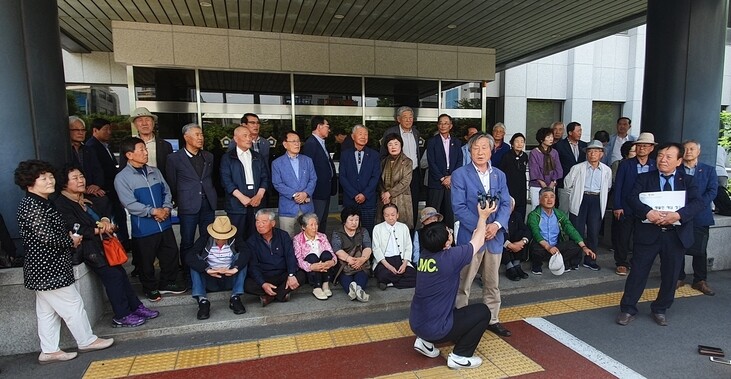hankyoreh
Links to other country sites 다른 나라 사이트 링크
Several victims of Jeju Massacre still remain unaccounted for

“How can I shut my eyes when I couldn’t even find my husband’s body? It looks like I’ll die without ever finding my husband again.”
Hyeon Gyeong-a, a resident of the Ara neighborhood in Jeju City who at 97 is nearing her hundredth birthday, had tears in her eyes. In November 1948, at the height of the scorched-earth operation following the Jeju Uprising (Massacre) on April 3 of that year, Hyeon, her husband Oh Hyeong-ryul, and their family fled after their village was set ablaze by soldiers and police. They took refuge in the neighborhood of Nammun (now the Ido No. 1 neighborhood of Jeju City), where acquaintances lived, but the police arrived shortly afterwards to take Oh away for having “come from the hills.” On Dec. 8, he was sentenced to 15 years in prison by a court-martial and taken to Mokpo Detention Center. Hyeon never saw her husband again.
Lee Sang-ha, an 84-year-old resident of the Jungmun neighborhood in Seogwipo who survived the massacre of his family of eight (including his grandparents, parents, and siblings), requested a retrial of the case of his brother, who was shot at Jeju Airfield at the age of 25.
“The government released its Jeju April 3 investigation report, and the president apologized. It seemed like things would be resolved when the Special Jeju April 3 Act was enacted, but they haven’t been, which is why I requested the retrial,” he explained.
Family members of missing prisoners from the Jeju Massacre have begun requesting retrials following the emergence of evidence that the courts-martial conducted at the time were illegal. The Association of Surviving Family Members of Victims and Missing Persons from Jeju April 3, headed by chairperson Kim Pil-moon, submitted a request on the afternoon of June 3 with Jeju District Court for a retrial of missing prisoners. The prisoners in question disappeared during the Korean War after being incarcerated in mainland prisons following courts-martial in Jeju in December 1948 and July 1949, during the events of the Jeju Massacre. Most of them were reportedly shot after the war broke out. Of the 3,500 or so individuals who remain unaccounted for, at least 2,530 were sentenced to prison by court-martial decision.
The association moved to request the retrial after 18 surviving prisoners received what amounted to an exoneration in their retrial request against the government on Jan. 17.
But while the surviving prisoners were in a position to point out the illegal nature of the courts-martial they faced, the family members face the difficulty of having to prove on their own that their family members went missing while in prison following court-martial decisions. With the latest retrial request, 10 family members of missing persons took the first step. Because none of the missing prisoners survived, they are represented in the lawsuit request by siblings or direct descendants.
Jeju April 3 experts noted that many prisoners remain unaccounted for, with family members facing difficulties in filing individual lawsuits because of their advanced age. To address this, they called for swift passage of the Special Jeju April 3 Act, which contains provisions nullifying the court-martial decisions but remains pending in the National Assembly.
By Huh Ho-joon, Jeju correspondent
Please direct comments or questions to [english@hani.co.kr]

Editorial・opinion
![[Column] Park Geun-hye déjà vu in Yoon Suk-yeol [Column] Park Geun-hye déjà vu in Yoon Suk-yeol](https://flexible.img.hani.co.kr/flexible/normal/500/300/imgdb/original/2024/0424/651713945113788.jpg) [Column] Park Geun-hye déjà vu in Yoon Suk-yeol
[Column] Park Geun-hye déjà vu in Yoon Suk-yeol![[Editorial] New weight of N. Korea’s nuclear threats makes dialogue all the more urgent [Editorial] New weight of N. Korea’s nuclear threats makes dialogue all the more urgent](https://flexible.img.hani.co.kr/flexible/normal/500/300/imgdb/original/2024/0424/7317139454662664.jpg) [Editorial] New weight of N. Korea’s nuclear threats makes dialogue all the more urgent
[Editorial] New weight of N. Korea’s nuclear threats makes dialogue all the more urgent- [Guest essay] The real reason Korea’s new right wants to dub Rhee a founding father
- [Column] ‘Choson’: Is it time we start referring to N. Korea in its own terms?
- [Editorial] Japan’s rewriting of history with Korea has gone too far
- [Column] The president’s questionable capacity for dialogue
- [Column] Are chaebol firms just pizza pies for families to divvy up as they please?
- [Column] Has Korea, too, crossed the Rubicon on China?
- [Correspondent’s column] In Japan’s alliance with US, echoes of its past alliances with UK
- [Editorial] Does Yoon think the Korean public is wrong?
Most viewed articles
- 1[Column] Park Geun-hye déjà vu in Yoon Suk-yeol
- 2Thursday to mark start of resignations by senior doctors amid standoff with government
- 3Kim Jong-un expressed ‘satisfaction’ with nuclear counterstrike drill directed at South
- 4[Column] ‘Choson’: Is it time we start referring to N. Korea in its own terms?
- 5N. Korean hackers breached 10 defense contractors in South for months, police say
- 6Will NewJeans end up collateral damage in internal feud at K-pop juggernaut Hybe?
- 7Why Korea shouldn’t welcome Japan’s newly beefed up defense cooperation with US
- 8[Editorial] New weight of N. Korea’s nuclear threats makes dialogue all the more urgent
- 9[Guest essay] The real reason Korea’s new right wants to dub Rhee a founding father
- 10[Column] Yoon’s first 100 days should open our eyes to pitfalls of presidential system